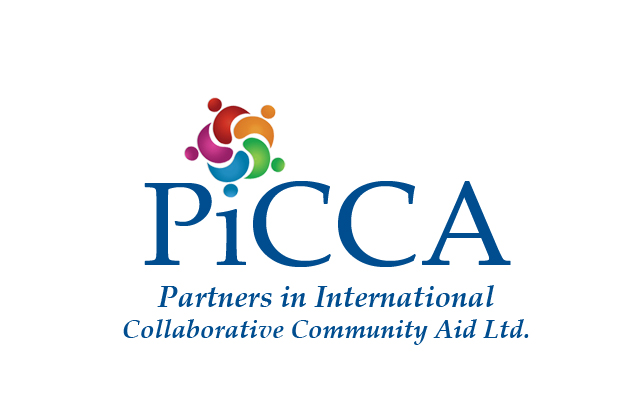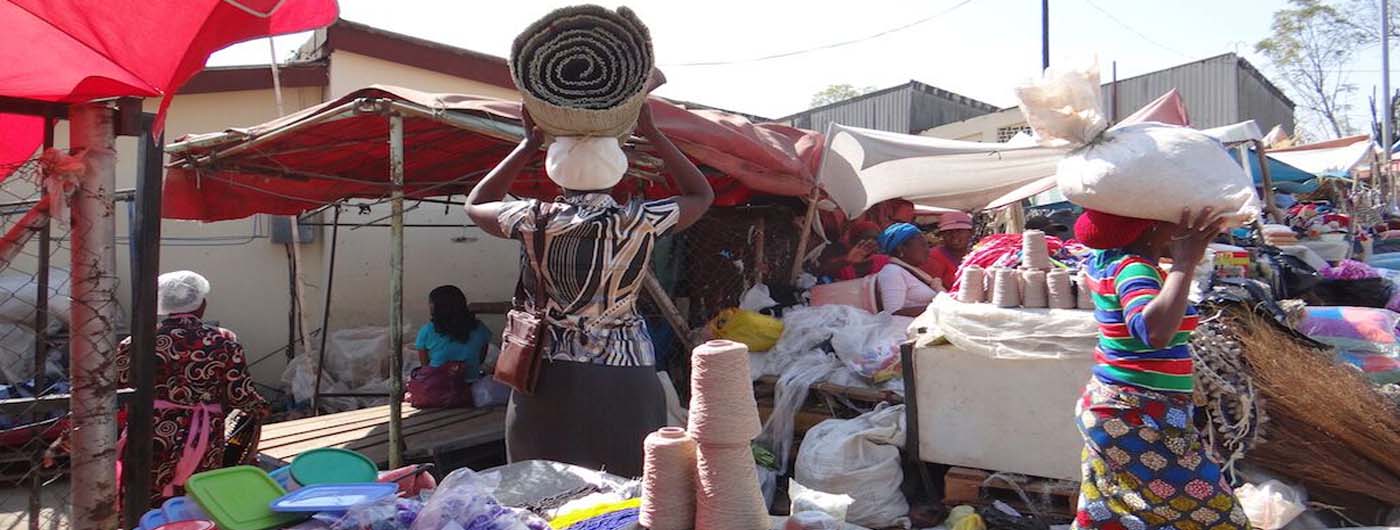
OUR PROJECTS
PiCCA chooses to fund projects that work in partnership with local communities overseas to support equity, opportunity, justice and peace and help address the root causes of the community’s identified needs in a sustainable way. We will consider a community’s identified needs across a broad range of areas, such as employment creation, capability development, micro-business development, construction of needed infrastructure, food security, improvement to health outcomes, empowerment of women or reconciliation between groups in conflict. Mostly our projects are one-off, but are housed within a broader community plan.
Solar Energy Project in Haku, Bougainville (2023)
The Hako Women’s Collective (HWC) has been funded to obtain and install a Solar Power System which will provide low cost, reliable and renewable energy to the five buildings which HWC uses to provide services – the Library/Office; Luman Hipakoko (Community Centre); the Agricultural Hub; the Women’s Safe House and the new Men’s Hub.
This project is being jointly funded with the Indigo Foundation.
The project will enable HWC to expand its programs and services, especially in the evening. Women and children’s safety will be enhanced as reliable power will be supplied to the Women’s Safe House 24/7. The environment will benefit from less use of diesel fuel and HWC will save from a big reduction in the funds needed to buy diesel.

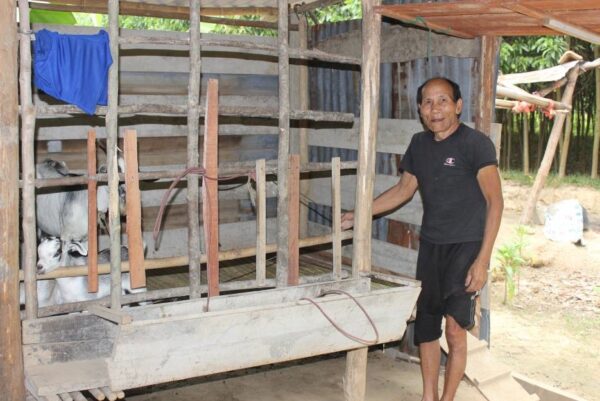
Goat Raising Project for families affected by Agent Orange in Quang Nham, Vietnam (2023)
Hearts for Hue (H4H) has been funded to deliver a Goat Raising Project for families who have a family member with a disability. 50 households will benefit from the project. Families will be trained in goat raising, goat shelter construction, veterinary issues and participating in a Goat Raising Club. A local management Board will also be trained marketing products.
The project is structured so that the offspring of the goats are shared between the first cohort of families participating and a new cohort. Male goats will be sold for meat to local markets and female goats will be raised for reproduction. The project will be self-sustaining.
The project will help to lift families out of poverty while providing real and valued work for people with a disability, thereby improving individual’s life satisfaction and challenging negative community stereotyping.
Stretim Sindaun: Improving livelihoods, income streams, and women’s and family safety and empowerment in Bougainville (2022)
Stretim Sindaun Project is in partnership with the Hako Women’s Collective (HWC), Bougainville.
The project is in two interlinked parts. The first part is a small-scale trial, importing and marketing Rocket Stoves to explore the viability of HWC running a broader social enterprise based on this activity. The aim is over time to generate income to sustain HWC’s vital (and mostly unfunded) community services including its domestic violence respite and prevention work.
The second part will capitalise on the rocket stove link to provide a community training program in their use together with training in other home-based livelihood enhancement activities such as the use of drum ovens and sewing machines. The training will focus on the skills and safety matters involved in these activities as well as the potential for developing personal income streams.
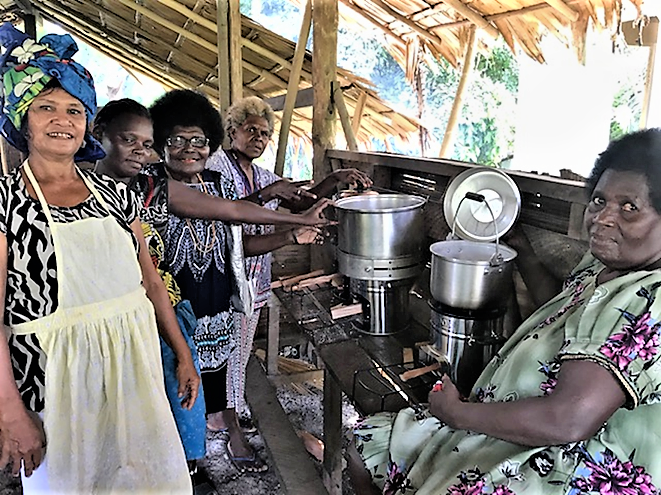
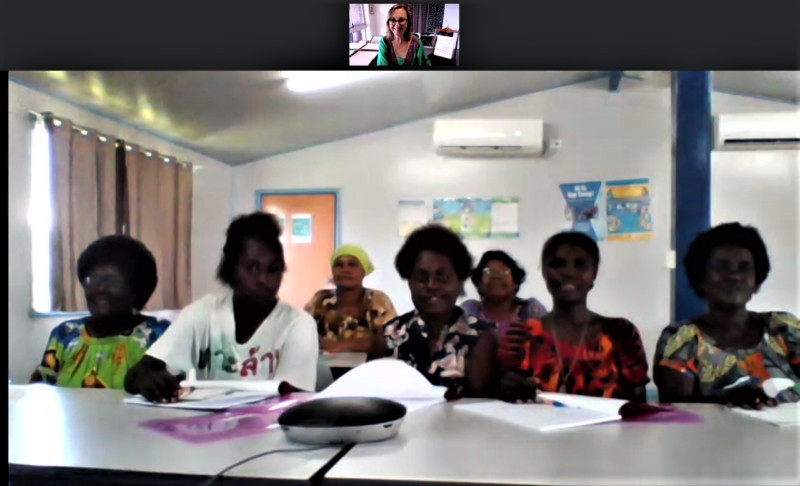
Operations Training Project with Hako Women’s Collective, Bougainville (2022)
This project builds on our existing partnership and work done over the last 24 months developing manuals, forms and guidelines to assist in strengthening the procedural rigour behind the Hako Women’s Collective program of services. Based on these documents, PiCCA is developing and delivering a series of training sessions aimed improving the confidence and capability of HWC to manage its finances and everyday operations. In the longer term, if the training is successful, improvements will be seen in HWC’s financial sustainability (and therefore lead to less dependence on aid for core operations).
The training is being delivered via Zoom from Australia to each of HWC’s individual teams (Finance, Administration, Safe House, Programs, Environment Project, Library, Assets and Canteen) on the basics of financial management and detailed processes to help each team run their part of HWC’s operations. The training is intended to be provided on a weekly basis from March to November 2022 inclusive. HWC participants will travel to Buka town for the training, to a conference room and internet connection donated by the International Foundation for Electoral Systems for this project.
PiCCA is supporting the project with funding of $8,000, all of which will go to enable the participation of the women in the training. All PiCCA’s costs, including training development and delivery, are being provided pro bono.
Improving Hygiene Awareness, Knowledge and Practice, and Hygienic Wash Infrastructure for Pupils at 10 Primary Schools in Phu vang, Thua Thien Hue province, Vietnam (2021)
PiCCA has entered into a partnership with The Phillips Foundation and Vietnamese NGO, Hearts for Hue in Vietnam to deliver a project promoting hygiene and sanitation in 10 schools in Phu vang, Vietnam.
With funding of $24,000 and significant in kind support, the project will construct new hygienic wash stations and deliver training in all matters sanitation and hygiene across the 10 participating school communities. This will build on our existing sister project in nearby Huong Tra and is a timely intervention to help combat the spread of Covid 19 and also to tackle the ongoing issue of the high rate of hospitalisation of children due to preventable health problems such as bacterial infections, respiratory illnesses and digestive disorders. Combined, close to 8,000 school children will benefit from these projects in the first year of implementation alone. Agreements with the local education departments will see the project infrastructure maintained for a least 5 years, rolling the impact of the work done now well out into the future.
The Phillips Foundation is a private ancillary fund established in 2017 by Anthony and Liz Phillips and their family. The Phillips Foundation partners with charitable organisations and projects around the world, delivering holistic education opportunities to remote or disadvantaged communities.
Hearts for Hue is a local charity organization working in and around Hue city, Vietnam. Hearts for Hue works to improve lives through community development programs focussing on health, education, sanitation, water access, environmental awareness and household economic development.
The tripartite arrangement between PiCCA, The Phillips Foundation and Hearts for Hue helps to mobilise the diverse contributions of each partner to deliver a significant and sustainable project impact on the ground.
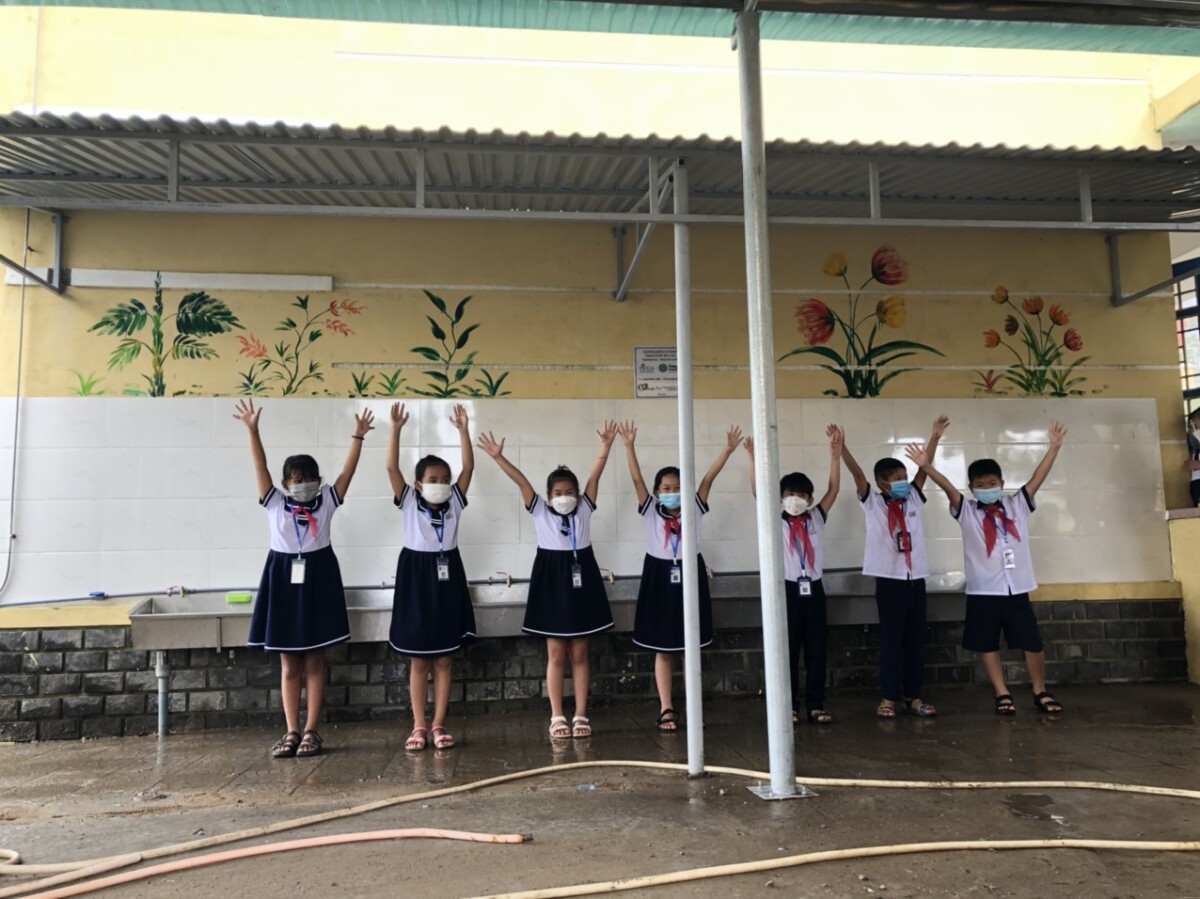
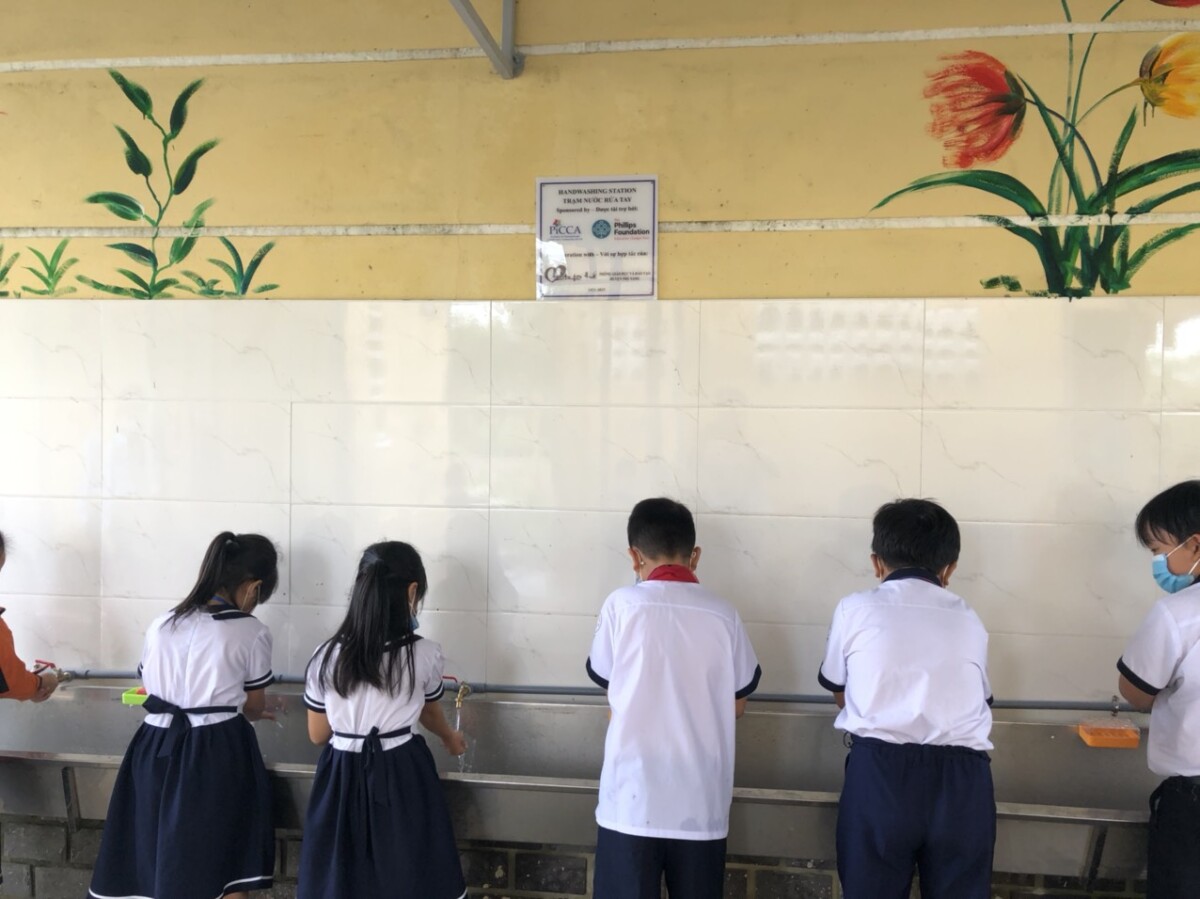

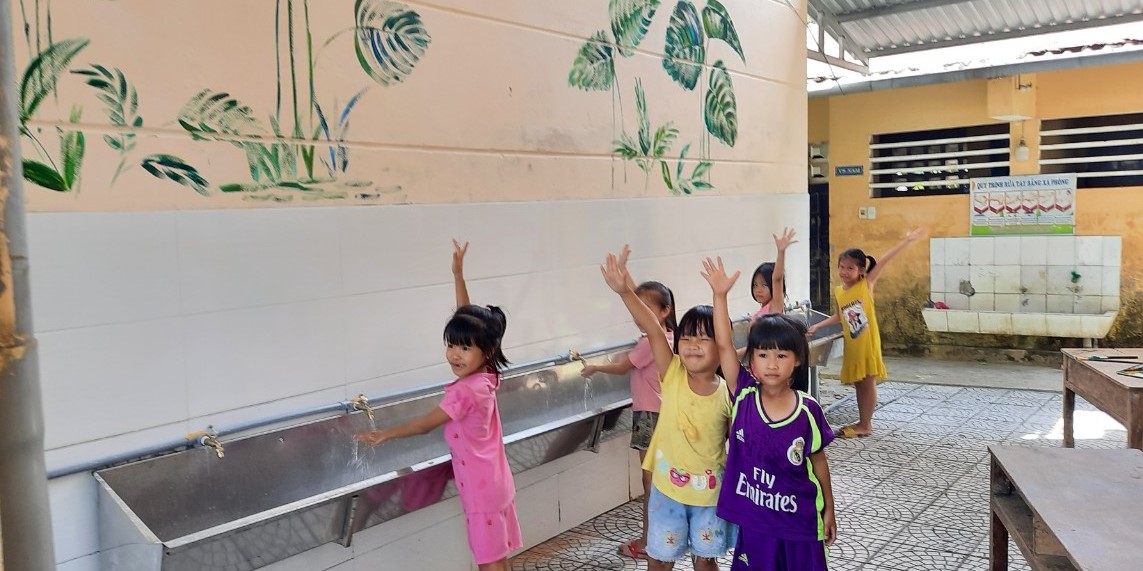
Improving Hygiene Awareness, Knowledge and Practice, and Hygienic Wash Infrastructure for Pupils at 10 Primary Schools in Huong Tra, Vietnam (2021)
This project involves the construction of 10 new hand washing stations in 10 Primary Schools in Huong Tra town, the delivery of train-the-trainer programs in hygiene and sanitation practices to teachers and other community leaders, and the delivery of practical hygiene and sanitation practices for all the children in the primary schools.
The 10 Primary Schools selected have 3,300 pupils who have inadequate hand washing or hygiene facilities.
The initial training courses will be carried out by Dr Dao Nguyen Dieu Trang, a Vice Dean of the Nursing Faculty of Hue Medical University.
20 teachers will receive train-the-trainer training and they will conduct 10 days of courses with 1,000 pupils. The pupils who receive the training will share what they learn with their classmates at monthly meetings of their class under supervision of their teachers.
The project is a practical intervention to improve Covid safe practices across the community and enhance general welfare and health awareness. An agreement with the Department of Education will see the wash stations maintained and the information gained from the training rolled out into the future.
Fitting out a child care and community centre in Pokhara, Nepal (2021)
This small project is providing for the fit-out of the new childcare facility and community centre run by the Butterfly Foundation in Pokhara, Nepal. The project is being delivered together with Partners, the Nepal Australia Friendship Association with whom PiCCA worked in the rebuilding of the school in Tawal in 2016. An additional component of this project includes the development of a child protection framework to be used as an instrument of staff training.
The Butterfly Foundation is a well-regarded, credentialled and registered Nepalese Charity which works to break the cycle of poverty and discrimination impacting on the most disadvantaged communities in Pokhara. As in previous PiCCA projects which have assisted in the delivery of small-scale community infrastructure, this fit-out will enable a significant service to be delivered and contribute to empowering a section of a community so often overlooked. In this case, the Butterfly Foundation provides childcare assistance to children from highly disadvantaged families. In the process it works with the families to develop knowledge and skills and provides support in accessing essential services, and even in developing businesses and employment opportunities. It also follows the children through to subsequent stages of education assisting them to make the leap between levels of schooling. In its childcare service, it provides a holistic response to the families to help them break the cycle of poverty.
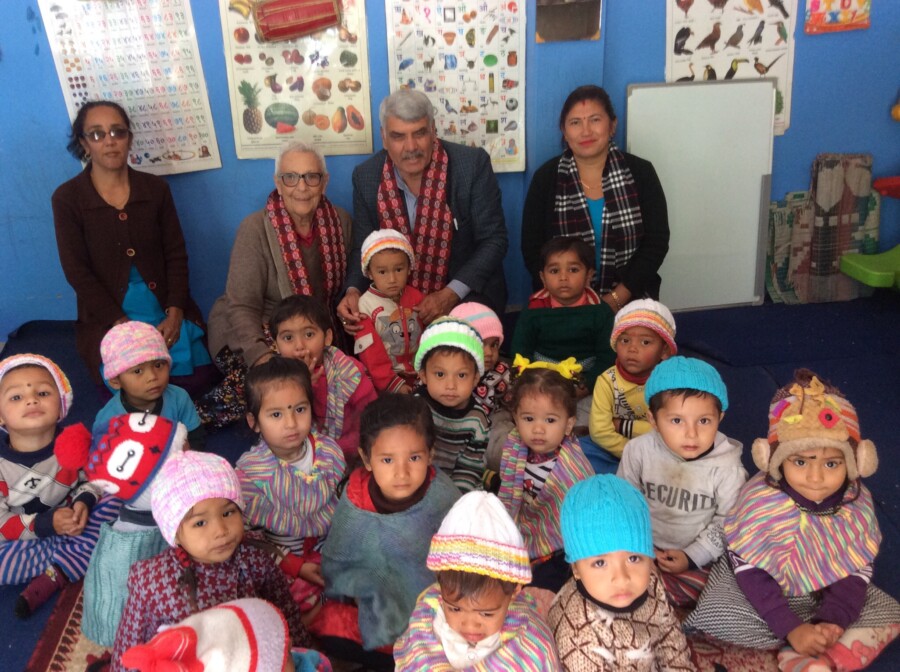
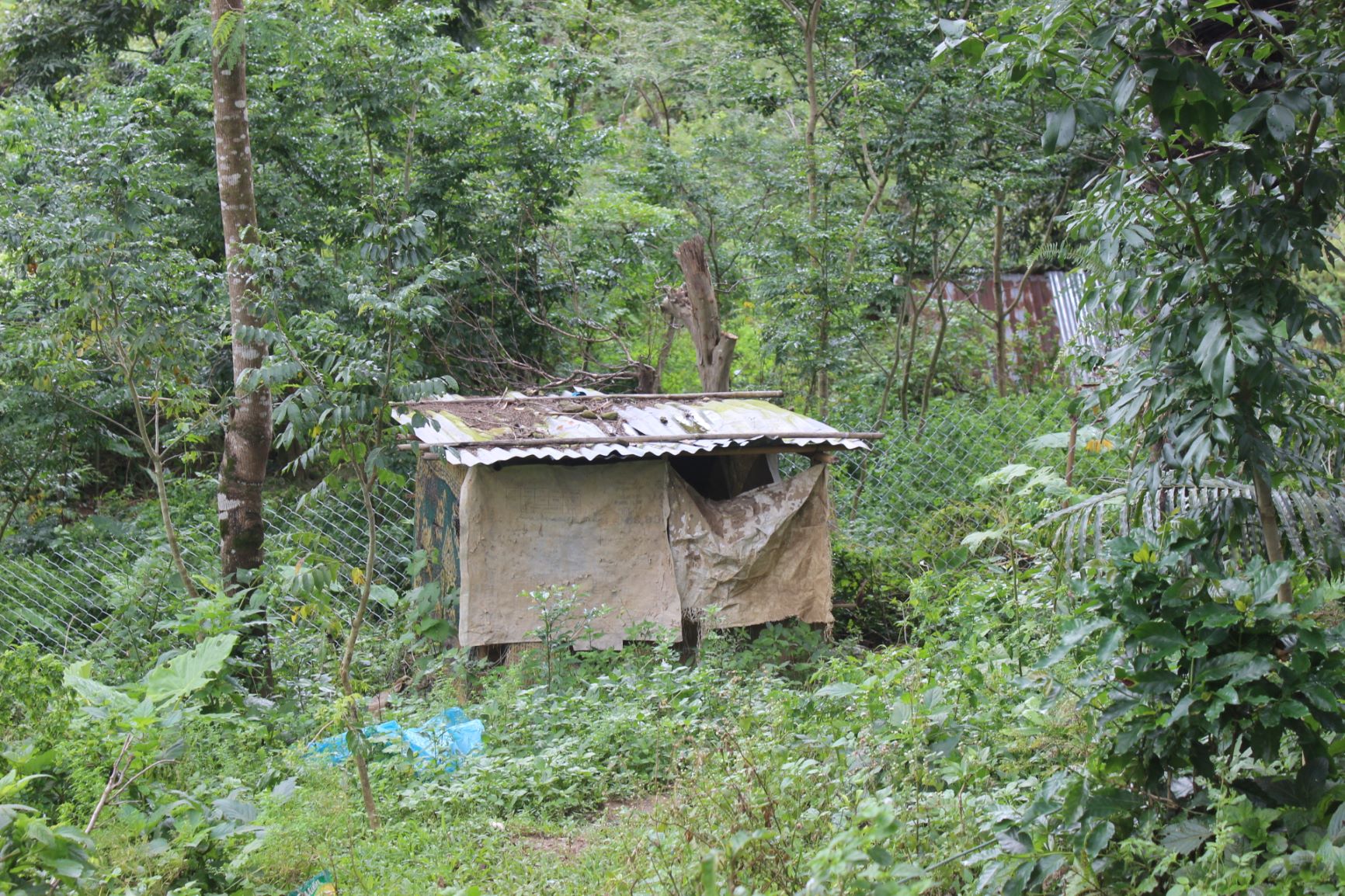
Promoting Hygiene and Sanitation in Quang Nham Commune, Vietnam (2020)
PiCCA’s 2020 project was based in Quang Nham, a mountainous area 75 km from Hue city. About 4,500 people live there with 97 percent from minority TaOi and Paco ethnic communities. Approximately half of all households are living in poverty and 64 percent use makeshift latrines, which cause health and environmental problems. In particular poor sanitation and hygiene have led to high incidences of preventable diseases which undermine other attempts to improve health and economic development.
PiCCA partnered with Hearts for Hue to construct fifteen toilets and shower systems and supporting septic tanks for some of the poorest families in Quang Nham. The families were trained and assisted to construct the facilities offering a skills development component as well as ownership of the project work. Alongside the construction works, “Train the Trainer” programs were also organized, and delivered by Mrs Tran Thi Minh Tam, a WASH expert from Thua Thien Hue’s Water Company. The training, targeting community leaders and teachers, raised awareness on the protection and maintenance of the latrine systems, on sanitation and hygiene issues more generally, and skilled up participants in the process of training others in the material. It is hoped this will help in the immediate campaign to restrict the spread of Covid19 as well as enhance the long-term health of the entire community.
Kamrangirchor Composite Development Project in Bangladesh (2019)
Picca’s project in Bangladesh was based in Kamrangirchor, Dhaka. Kamrangirchor is a 5.5 square kilometre island over the river Buriganga, where 1.2 million people live in slum-like conditions. The environment here is scarred by factory residue, rubbish, waste and poor sanitation. The community suffers from high levels of unemployment, and where there is employment it is usually in under remunerated casual labour in factories, construction, rickshaw pulling or domestic service.
Economic pressures force many young people to abandon education in order to contribute to family income through their labour. This leads to ongoing low literacy rates and decreased opportunities to break the cycle of poverty and disadvantage.
PiCCA partnered with the Symbiosis Foundation (SF) to facilitate the development of a community service hub in this area. The hub aims to enable the delivery of a range of much needed services to the community including pre-school education, vocational training, women’s self-help, health awareness (including nutrition, hygienic living and safe water), clinics in dental health, eye health, and antenatal, safe birthing and postnatal care.
PiCCA’s contribution supported the purchase of dental and optical clinic equipment and supplies. The eye clinic and the dental clinic are now operational and the Symbiosis project team has worked hard to make the services accessible to the local community. Additional PiCCA funding was intended for the maternal health clinic equipment and a TukTuk which can be used for driver training. Following a change in community priorities, the component of PiCCA funds originally destined to support the driver training program was redirected to support a sewing training program designed to increase employment opportunities for women. The sewing training program was inaugurated on 1 December 2020.
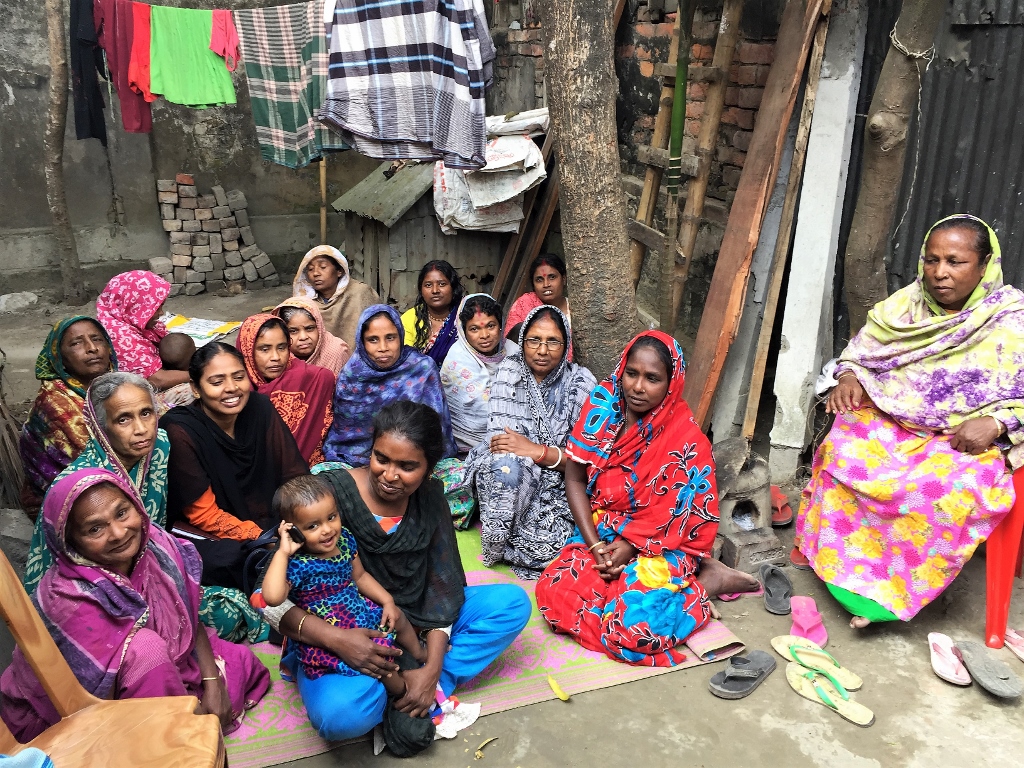
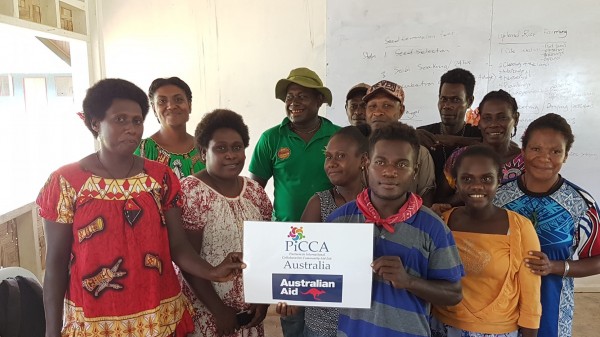
Haku Agricultural Hub & Training Activity, Bougainville (2019/2018)
In 2019 PiCCA was awarded an Australian Aid Friendship Grant to work with the Hako Women’s Collective (HWC) to deliver an Agricultural Hub and Training Activity in the north of Buka Island in the Autonomous Region of Bougainville.
The project addressed food shortages and poor nutrition by delivering training in modern agricultural methods and by developing a rice mill to enhance sustainable food security, diversity, nutrition, yields and income for the community. More than 90% of people in the region are subsistence farmers.
Women, young people and people with disability were the primary direct participants and with 83 families engaged, the training and the demonstration models reached a core of the community who have subsequently shared their new knowledge further afield.
The Department of Primary Industry in Bougainville worked with HWC’s Environment, Education and Advocacy Team (EEAT) to deliver training and advice. HWC’s existing Community Centre (the Luman Hipokoko constructed with the support through a previous PiCCA project) was used for the “classroom” training. Demonstration Gardens were established next to the hub to be used for “hands-on” training in improved agricultural methods. Beneficiaries’ Gardens were then established close to their houses. This improved accessibility (especially for people with a disability) and increase security.
The Hako Women’s Collective has established a rice milling social enterprise which together with the established backyard garden have proved an invaluable secure and sustainable source of food and income.
Improving living quality for people with a disability in Vietnam (2018)
Our partners in Vietnam are Hearts for Hue, (H4H) a non-profit, non-religious organisation established in 2007 with a mission to “create real and lasting positive change for poor residents in Thua Thien – Hue Province, especially residents in resettlement areas”.
PiCCA’s project with H4H took place in Vinh Phu, approximately 30 kms from Hue City, and was specially designed to work with families who have a disabled member to create a stable income and to improve the quality of life and standing of disabled people in the community. It provided support to 50 families in building chicken raising infrastructure, training in chicken farming practices and initiating a viably sized and inoculated clutch of chickens from which each family could develop small chicken farming operations.
Feedback from surveys conducted by H4H show that the project enabled the families to improve livelihoods and income generation, and provided an opportunity for the disabled members to contribute as productive and valued participants in family and community life.
90% of participants reported that the project created employment, generated income for families and improved participants’ living conditions. The income was used to buy food for families, help with school expenses and to expand chicken flocks and farming operations.
H4H subsequently coordinated the provision of marketing training and the development of a self-help club for participants to assist the ongoing sustainability of the initial project.
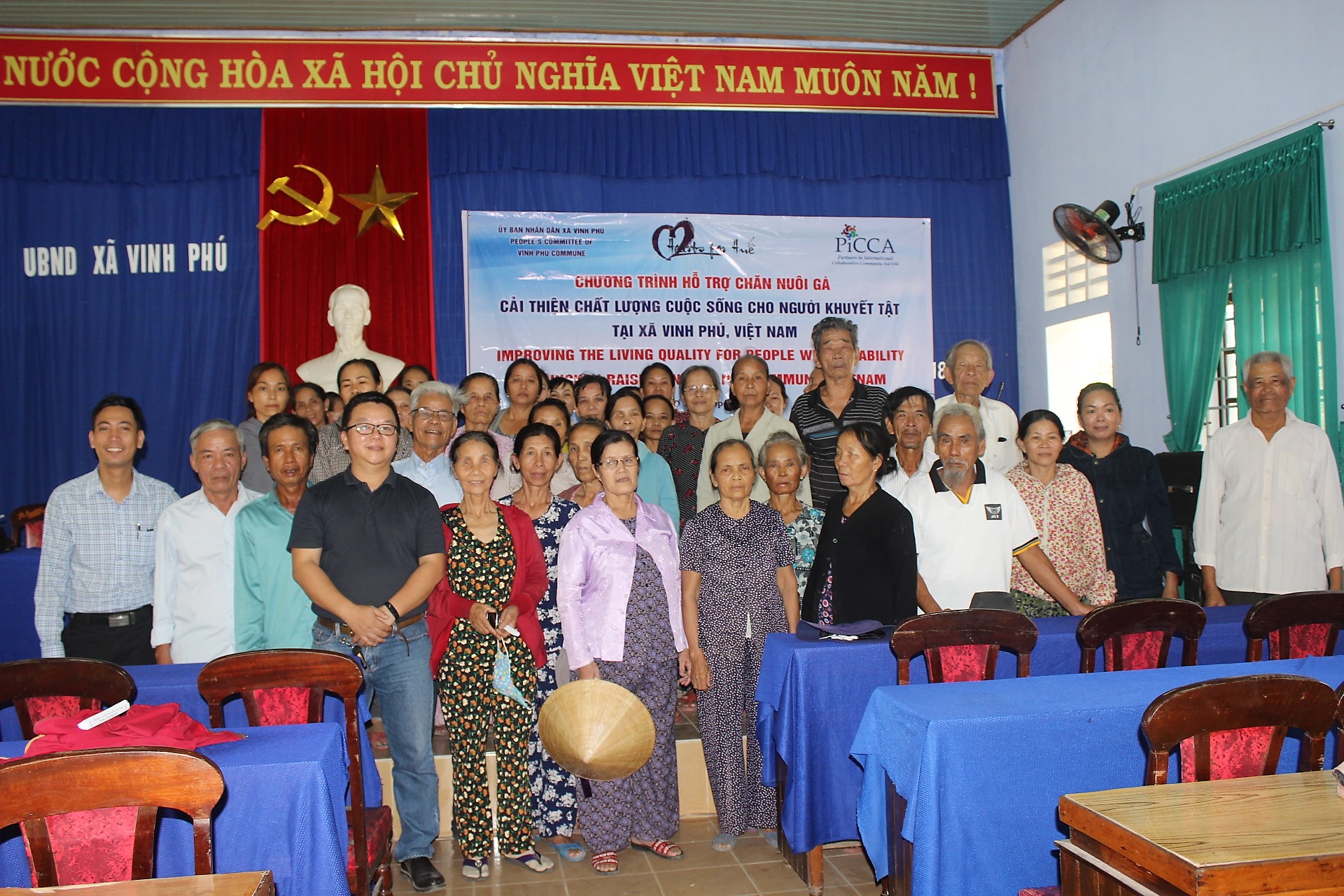
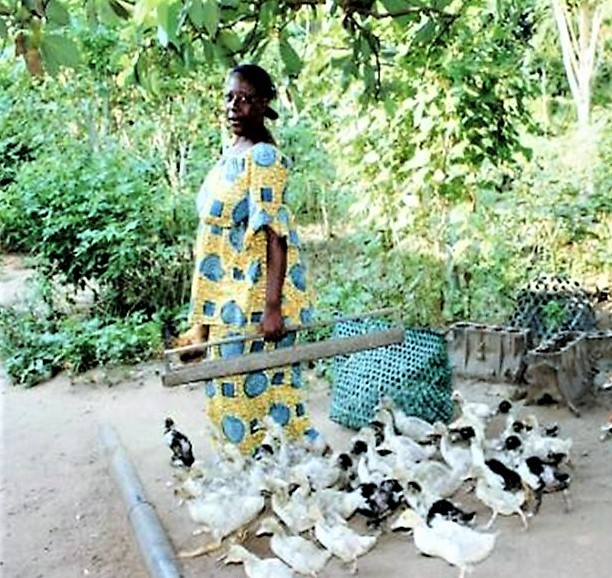
Village poultry for better livelihoods: vaccination training for farmers in the Congo (2018)
In the Democratic Republic of Congo, PiCCA, working with Kyeema and AusCongo, has established a program to improve health, production and vaccination of village poultry in a total of 250 households in fifteen village zones of Mbuji-Mayi.
Kyeema is an Australian based not for profit with extensive experience in programs delivering improved chicken health outcomes for small village farmers in many isolated communities across Africa and Asia. AusCongo is a volunteer organisation dedicated to community development projects that help the Congolese community in Mbuji-Mayi of the Democratic Republic of Congo to alleviate poverty, and to provide access to the socio-economic development.
Chicken farming forms the basis for food and income generation for many in this part of Africa but this is severely impacted by the 90% mortality rates that ravage the flock when Newcastle disease strikes. The project worked with local leaders, farmers, and stakeholders to develop an awareness of the disease, and trained a cohort of people skilled in inoculation to create a disease-free stock in a defined geographic area. More than 13,000 chickens were vaccinated across 16 villages and feedback from the community and vaccinators is that people are happy with the project and their chicken flocks are thriving.
A donation from travel specialist Encompass Africa has allowed the purchase of a solar fridge so that vaccines can be stored locally, reducing the need to make the 1000 km journey to and from Kinshasa where the vaccinations are produced.
Improving Services and Livelihoods program in Haku, Buka Island, Bougainville (2017)
PiCCA worked with the Hako Women’s Collective (HWC) in Buka Island in the Autonomous Region of Bougainville, PNG.
In the first stage of its program PiCCA supported HWC to build a Community Centre (Luman Hipokoko), comprising a large meeting space suitable for community education, disability accessible toilets, a shower, kitchen and a canteen. PiCCA also provided in-kind support by connecting HWC with an Australian architect (Ms Amber Garde) who designed the Community Centre on a pro-bono basis. Both HWC and PiCCA were determined that the building work on Luman Hipakoko would benefit the local community. To that end, six young people aged 18 to 30 were recruited from across the different villages in Haku as trainees to learn building skills. The trainees were paid an allowance and received close supervision from local tradespeople. PiCCA collaborated with a Sydney-based church group (C3) who also provided some funds and builders’ pro-bono services.
Luman Hipakoko was officially opened on 4 November 2017 and is now being used to run health, education, disability, parenting, human rights and other programs. It also supports social enterprises such as catering, room hire and a shop, which provide employment, income and revenue for HWC. PiCCA continues to support HWC to develop activities aimed at improving the community’s social and economic circumstances.
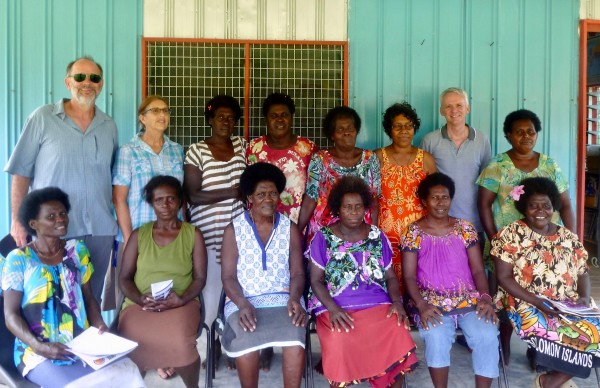
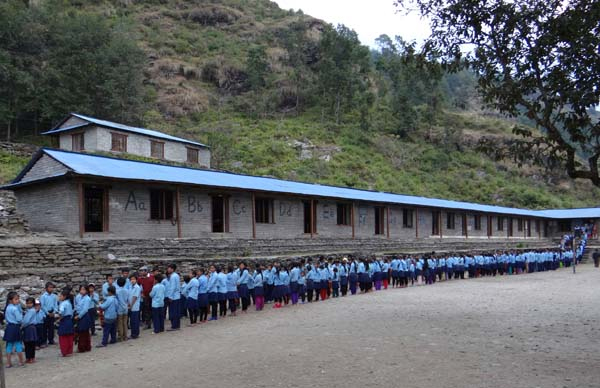
Building a classroom in earthquake ravaged Nepal (2016)
PiCCA partnered with the Hilly Region Development Club in Nepal and the Australia Nepal Friendship Association to rebuild a classroom destroyed in Tawal village as a result of the massive earthquake in April 2015. The project involved building a multipurpose classroom for use as a computer room, a science lab and a community meeting room. The classroom was built by local tradesmen/builders, supported by local labourers, in accordance with the new Nepalese Government building code as it relates to earthquake resistant techniques.
The school is a hub which services villages in the Tawal area and educates 430 students from Nursery class to Grade 10. While building took place the students were accommodated in temporary classrooms consisting of bamboo matting walls with dirt floors, or tents. During the monsoon the conditions were extremely bad.
The new classroom now provides a safe environment conducive to learning. The classroom has been used by students since April 2018. In addition to building the classroom using earthquake resistant techniques, a gabion wall was built above the school to protect it from future landslides. The school was officially opened in February 2019.
Sustaining food and volunteers to support HIV/AIDS orphans in Eswatini (formerly Swaziland) (2016/2015)
Our partner organisation for this project is AMICAALL (Alliance of Mayors’ Initiative for Community Action on AIDS at the Local Level) in Eswatini.
Eswatini has the highest prevalence of HIV/AIDS in the world with 27 percent of adults living with HIV. Consequently, there are thousands of orphans, most of whom are cared for by extended family. There is considerable strain on families who are supporting another child. AMICAALL (Eswatini’s response to AIDS at the local government level) hosts 49 Social Centres which provide at least one meal a day to approximately 4,000 orphaned and vulnerable children. The centres also provide early childhood care and development, psychosocial support, birth registration, child health and recreation services.
Currently, the social centres lack a reliable source of nutritious food to provide children their daily meal. Children stop attending the centres when food availability is not assured. In addition, the centres rely on volunteers to prepare meals and provide services.
This project has funded the development of a farm to grow maize and beans as well as assorted vegetables. This has improved the consistency and variety of the food available for the children and the nutritional value of their meals. It has also allowed volunteers to be supported through food parcels.
The farm has been established and is successfully producing maize. Each harvest produces approximately 150 bags of maize which feed 400 children in some of the most needy areas. Plans are afoot to expand the area of land under production and to secure funds for irrigation. These steps will dramatically increase the capacity of the farm to feed more children.

OUR PROJECTS
FROM 2015 TO 2020

